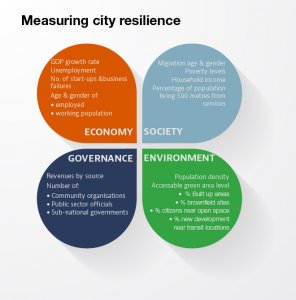Why are SMEs so important for public procurement?
Read on as we discuss why engagement with smaller businesses in public procurement is critical. We’ll delve into how the Covid-19 pandemic has changed procurement, and how urban resilience must be central to new initiatives.
SMEs constitute around 90% of businesses in the EU. Generating between 50% and 60% of value-added to economies in OECD countries, arguably they should have an equal share of government spending. Yet by and large, this isn’t the case.
The pandemic and economic situation has pushed resilience up the agenda. As governments look to improve economies and rates of innovation in public services, SME engagement is often touted as a solution.
Why should public procurement engage more SME’s?
Traditionally, public sector procurement practices have favoured the most cost-effective and efficient methods to avoid risk. This results in a bias towards larger organisations, with perceived greater capacity to cope at a reduced cost.
But there is a subsequent loss. In a recent report, The World Bank reported that governments that worked heavily with SMEs saw:
- More healthy competition between suppliers;
- Better value for tax-payer money;
- More innovative ideas and practices;
- Better production of jobs in the local economy;
- Better social and economic equity; and
- Industry deconcentration away from the few to the many.
The OECD notes that engaging SMEs is critical to building more equitable and stable economies as they make up the sheer majority of organisations and employers globally. It’s important to note that it isn’t just the government doing the small businesses a favour; it’s commonly held that SMEs are more flexible, adaptable and find efficiencies faster. They are also likely to provide out of the box solutions, addressing needs beyond the prescribed RFP. Larger organisations might fit prescribed requirements to the letter but are not incentivised to promote additional innovation or efficiencies beyond this.
Whilst policymakers do understand the benefits, it’s hard to see the evidence of any far-reaching change. In 2018 and 2019, a quarter of all the UK’s procurement spend was with SMEs, a long way short of reaching the aim of 33% by 2022.
As the London Office of Technology and Innovation found last year,
“Almost 50% of the service areas rely on technology acquired from 10 key vendors. They are not always purchased directly. Instead, the technology is often bought through a reseller or partner.
91% of spending reported by councils was with the top 15 suppliers, but this represents only a third of the number of contracts awarded.”
This means that technology contracts are handed to the top incumbent few, rather than the many smaller suppliers. This happening in one of the world’s leading tech startup ecosystems provides food for thought.
The impetus and understanding of the benefits are there. Yet as the clock ticks down to 2022 and the 33% goal how has 2020 changed things?
How has Covid-19 changed things?
We’re witnessing a turning point in 2020 where the global emergency has meant that public services have had to digitise and become more citizen-centric. This process has been in the works for years but necessity has meant that it’s been executed within a matter of weeks.
Many authorities have adopted new strategies, calling on the private sector and innovative startups to help. Whether it’s setting innovation challenges or providing funds for companies who can mitigate the impact, there is a clear call to action.
Within our network alone, Nitrous has seen autonomous vehicle startups adapt overnight to repurpose their technology for measuring social distancing on city streets; or giving away services to provide mobility for essential workers. There are countless examples where innovative solutions have been created and put into action over a matter of days by startups. It’s this agile and innovative mentality that is essential for public services to modernise to the increasingly demanding needs of the citizen.
With urgency prioritised, everyone (not just organisations) has been looking locally for solutions. This community-focused approach should be built upon and from a new platform for cities to have more citizen-centric public services. SMEs – who understand their local markets well – would be well-tipped to fulfil this.
Whilst all this sounds like positive progress, it could go either way. There are many reports that government spending is increasing with larger, incumbent organisations. Non-competitive multimillion-pound bids have been given out to organisations like Serco, who’re charged with running the track and trace programme and more recently to provide emergency contact centre services for vulnerable people who are self-isolating.
Although no one is arguing that an SME can fulfil this nationwide task it does raise a question. How many more times do we have to see the trade-off between short-term fixes versus a long term investment in innovation through startup engagement?
Urban resilience
One last word about urban resilience, SMEs are severely vulnerable to economic shocks such as the one we are experiencing at the moment. Mass-failure of smaller organisations could be calamitous to the social and economic fabric of a city simply because they constitute the sheer majority of businesses. It’s important to remember that greater SME engagement could be the difference between failure and weathering the storm.

It isn’t just the public sector needing assistance during a crisis; there’s a symbiosis to this relationship. SMEs will also need assistance from the government to weather the bleak economic forecast, with many looking for public sector partnerships as their lifeline.
Will these new attitudes cultivated during the pandemic remain after it’s over? Or do we run the risk of eventually returning to business as usual? Only time will tell.
Interested in urban resilience and collaborative procurement? Make sure you attend our London Tech Week event on bringing innovation to procurement. We’ll also be showcasing our new platform – Thirty3, co-developed with the Greater London Authority and the London Office of Technology & Innovation. Register here for more details.


